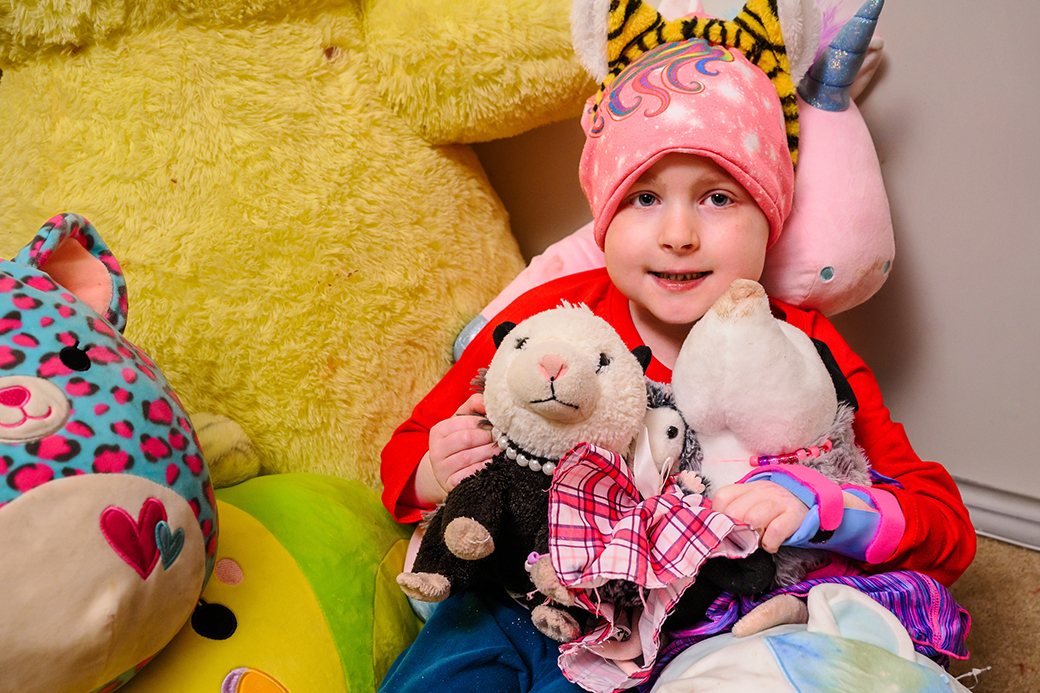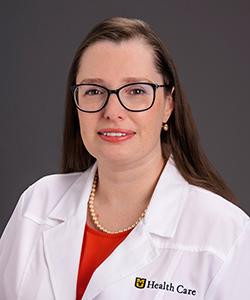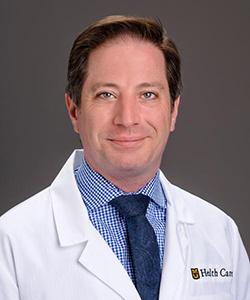It was by pure coincidence that the North American opossum became a central figure in 6-year-old Sophie Bergen’s fight against cancer. But the pink-nosed marsupial is a symbol of strength and a source of comfort for Sophie and her family.
Sophie's fascination started on trip to the St. Louis Zoo. The Bergens drove home to Springfield, Missouri, with a stuffed opossum from the gift shop. Sophie named her Trash Queen.
“She just became obsessed with opossums,” Beth, her mom, said. “Everyone knows that if you’re talking about Sophie, you’re talking about opossums.”
Trash Queen goes everywhere with Sophie: Held close while she and Beth watch cooking and baking shows, perched on the counter as they recreate those same recipes in the kitchen, and watching closely as she and her dad, Hosea, play video games together.
“Sophie’s always been very creative,” Hosea said. “The best way I can describe her to people is she’s always wanting to make something.”
She leaves her mark all over the Bergen home, from her name written in lipstick by the front door to corners decorated with crayon and finger paint. Thankfully for their parents, Sophie and her younger siblings, Madi and Ollie, are young enough that their roughhousing doesn’t leave marks on the walls, too.
Diagnosis by Text-Ray
In early 2024, Sophie started complaining of wrist pain, and Beth and Hosea noticed a bump on the inside of her left wrist near her thumb. At first, they thought it was from too much energy during a play session with her sister.
But after a few days, the bump still didn’t go down. Her parents decided to take her to urgent care for an X-ray. That scan showed a tumor on Sophie’s radius bone. Her doctors called MU Health Care pediatric orthopaedic oncologist Cecilia Belzarena, MD.
“Thankfully, MU Health Care has orthopaedic residents that work at our local hospital, and they were able to send Dr. Belzarena a text that night,” Beth said. “They got the balls in motion and said, ‘We’re going to get Sophie the best care.’ It was so nice to feel like I didn’t have to put pressure on myself to advocate for her because they did it themselves. They made us feel like the utmost priority.”
Doctors thought it was osteosarcoma, a rare bone cancer. There are fewer than 1,500 new cases in the United States each year, and it most commonly appears in adolescents and young adults going through growth spurts, and in adults from age 55-65.
“Osteosarcoma is quite a rare disease, which is why patients need care at specialized centers like ours where we have the expertise, nursing, child life support, everything to make treatment possible,” Belzarena said. “Sophie’s case, which was around her wrist, is particularly rare. There aren’t that many cases in the world affecting the radius. And the extent of her disease also made it particularly more complex as well.”
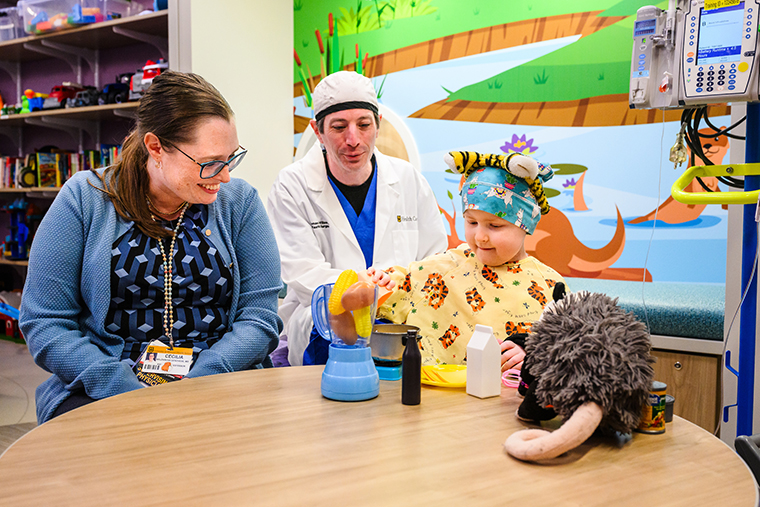
Dr. Belzarena looked at the text message of Sophie’s X-ray and called the Bergens as soon as she could. MU Health Care had a full diagnostic and pre-treatment appointment ready for Sophie on Monday morning. So the Bergens, and Trash Queen, made the first of many trips up to Columbia.
Sophie got a port placed and started a three-month chemotherapy regimen the week after her diagnostic tests. Those scans showed her cancer had spread to more than 85 percent of her bone.
Osteosarcoma very often requires surgery to remove the affected bone. Some patients need limb amputation to save their lives. But Dr. Belzarena was confident Sophie would not need amputation and knew just who to call so that Sophie got the best care possible.
Moving Sinks and Filling Holes
That person was Thomas Willson, MD, a pediatric plastic and reconstructive surgeon. As chemo slowed the progression of Sophie’s cancer, Dr. Willson, Dr. Belzarena and the other members of her care team talked over their options.
Patients who have nearly finished growing have treatment options like bone implants or replacements, also called endoprostheses. Sophie, with many years of growth still ahead of her, needed a different option. Dr. Belzarena and Dr. Willson recommended transplanting part of a bone from her right leg to take the place of her radius.
“Dr. Belzarena and other cancer doctors, their job is sort of to dig holes. My job is to fill the holes back in,” Willson said. “If Dr. Belzarena believes she can remove the entire tumor, it’s my job to find a replacement for Sophie’s radius and help facilitate her cancer-free life.”
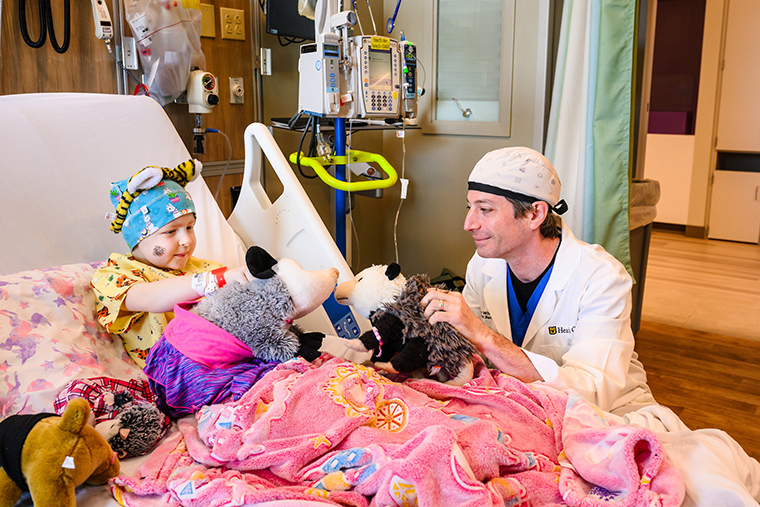
Sophie’s care team planned out every detail of a 10-hour surgery that would remove her tumor and prevent the need for amputation.
One of the incredible things about the human body is its ability to adapt. The fibula, the smaller bone in the lower leg, has a similar curve and shape as the radius. And its growth plate, particularly which veins and arteries handle blood flow for the growth plate, are well-studied.
“I absolutely did not think that it was possible to replace one bone with another,” Beth said. “That was news to me. I was just afraid that she was just going to lose her arm, but they reassured me, ‘No, modern medicine has caught up.’ It's just extraordinary.”
Similar to removing one bathroom sink and replacing it with one from somewhere in your house, Dr. Belzarena would remove Sophie’s cancerous bone. Then, Dr. Willson would temporarily stop blood flow to her right fibula, remove 60% of it while bringing along the tiny blood vessels that keep the bone alive, and transplant it into her left arm.
“Because implants were not an option, we had to come up with a solution that was tailored for her,” Dr. Belzarena said. “Given the specialties that we have here and the great team that we have at MU Health Care, we were able to come up with a solution for a condition with only a few recorded cases in the world, and we were able to accomplish the surgery successfully.”
Care for Kids in a Hospital Built for Kids
It’s no surprise that, for lots of kids, hospitals are scary places. Sophie might have felt that way at the start, but she (and her family) almost began to look forward to their trips. Wearing a pair of Mizzou Tiger ears that only come off at bath time, Sophie started calling Children’s Hospital “Tiger World.”
“She latched onto the statue of TJ in the lobby from the moment she saw it,” Hosea said. “Coming to a hospital that specializes in children and knows how to communicate with children and how to do things that were scary and make them seem not scary really helped her through that.”
Then, there was the mystery of Trash Queen’s expanding family.
While off on an errand one day, Hosea and Sophie returned to her room to find a new stuffed opossum waiting for her. Sophie knew what to do right away, naming this one Trash King. Hosea still hasn’t discovered which member of the hospital staff expanded his daughter’s royal opossum court.
“To know that somebody cared enough to know what she liked and bring her something to expand that collection was really nice,” Hosea said. “Dressing them up, playing pretend in the playroom at the hospital, they really kind of become her friends when she's away from her real friends here at school and her brother and sister.”
The Trash family expanded again shortly after Sophie’s surgery, when her grandparents gifted her a third stuffed opossum that she named Trash Princess.
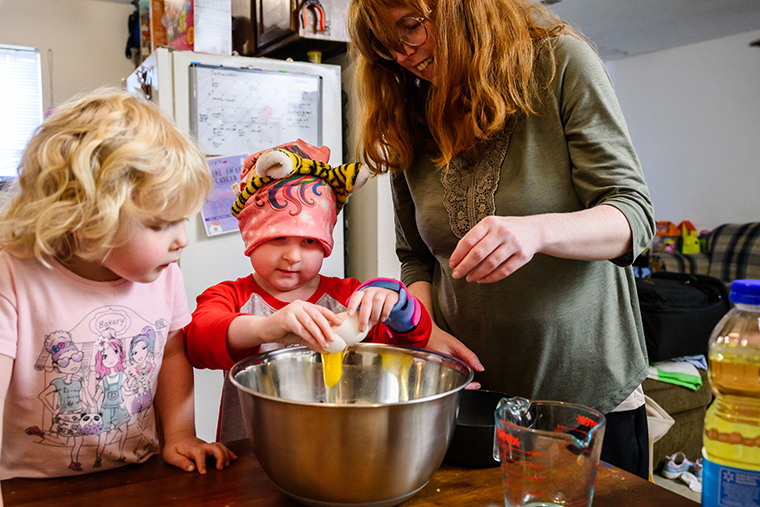
All three come with her to her physical therapy appointments, to the playroom on the seventh floor of Children’s Hospital or meet Duo dog Link when he comes by to visit.
Sophie is visiting Tiger World less often because she has moved into the maintenance phase of her chemotherapy. She will continue to see Dr. Willson to make sure her leg and wrist heal properly and that her wrist retains as much function as possible.
In the fall of 2024, Sophie was very excited to start first grade. And her love of cooking has continued to grow: She currently has her sights set on becoming a chef so she can cook every day.
“I think that being treated at Children’s Hospital made a world of difference,” Beth said. “It’s just been such a seamless process with her care. We had such a great experience with MU Health Care, all the doctors, nurses, support people and care Sophie received. We made a wonderful decision.”



